Abstract
Experiments were performed to determine the effect of starvation on T-cell mediated host defences. In mice starved for 72 hr, the number of thymocytes fell by 98%, spleen cells by 82% and peripheral blood cells by 44%. By 7 days after the end of starvation, values had returned to within 50% of baseline. The percentage of L3T4 and Lyt-2 antigen-bearing cells fell in the thymus, but the percentage of Thy-1.2-positive cells did not change. Starvation decreased the percentage of lymphocytes in peripheral blood but increased the percentage of granulocytes. During starvation, the cellularity in thymuses, spleens and peripheral blood was preserved in adrenalectomized mice compared to normal or sham-adrenalectomized mice. Confirming previous results of ours, starved mice were resistant to i.v. challenge with Listeria monocytogenes immediately after starvation. However, when starved mice were immunized with a sublethal dose of Listeria immediately after starvation and challenged 3-4 weeks later, they were less resistant to Listeria than fed, immunized mice. Similarly, spleen cells of starved, immunized mice had a reduced capacity to transfer immunity passively to non-immune mice. Increasing the immunizing dose of Listeria in starved mice increased the level of immunity that developed. These data indicate that starved mice have a marked reduction in T-cell cellularity, possibly related to corticosteroid production during the stress of starvation. Although starved mice were relatively resistant to Listeria immediately after starvation, they had a reduced capacity to develop T-cell mediated immunity to Listeria. This deficiency could be partly overcome by increasing the immunizing dose of Listeria.
Full text
PDF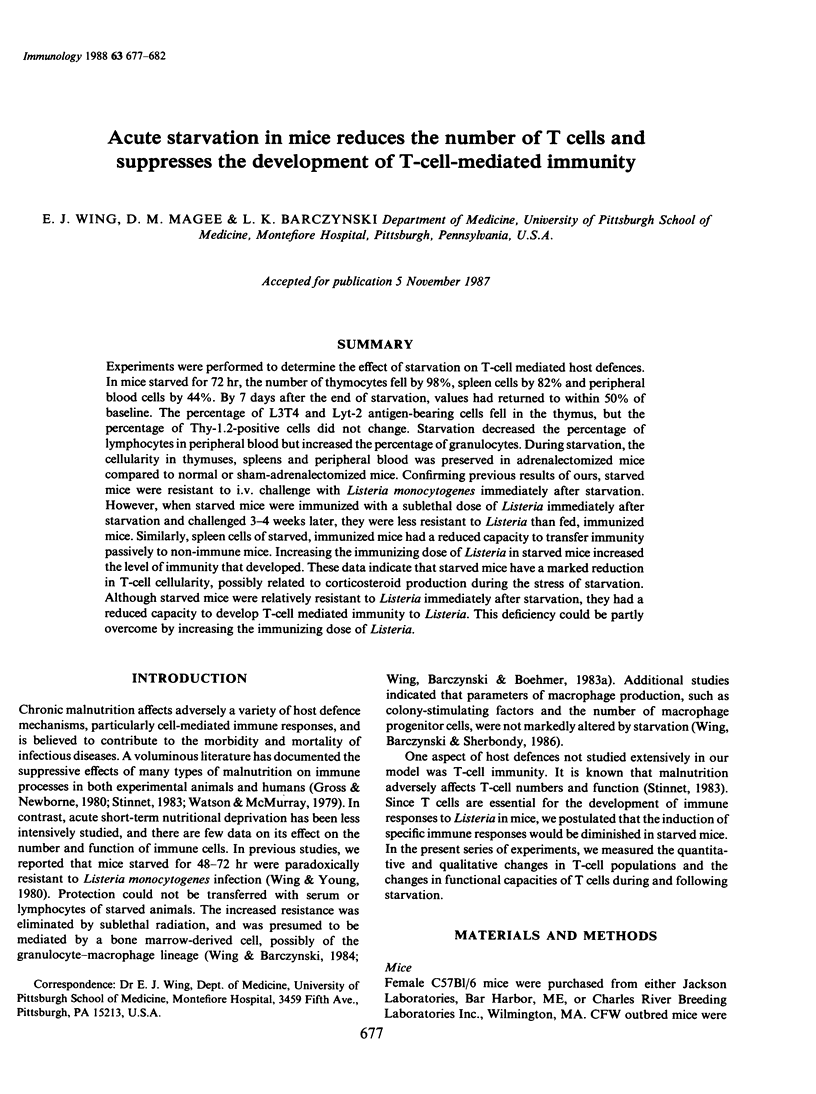
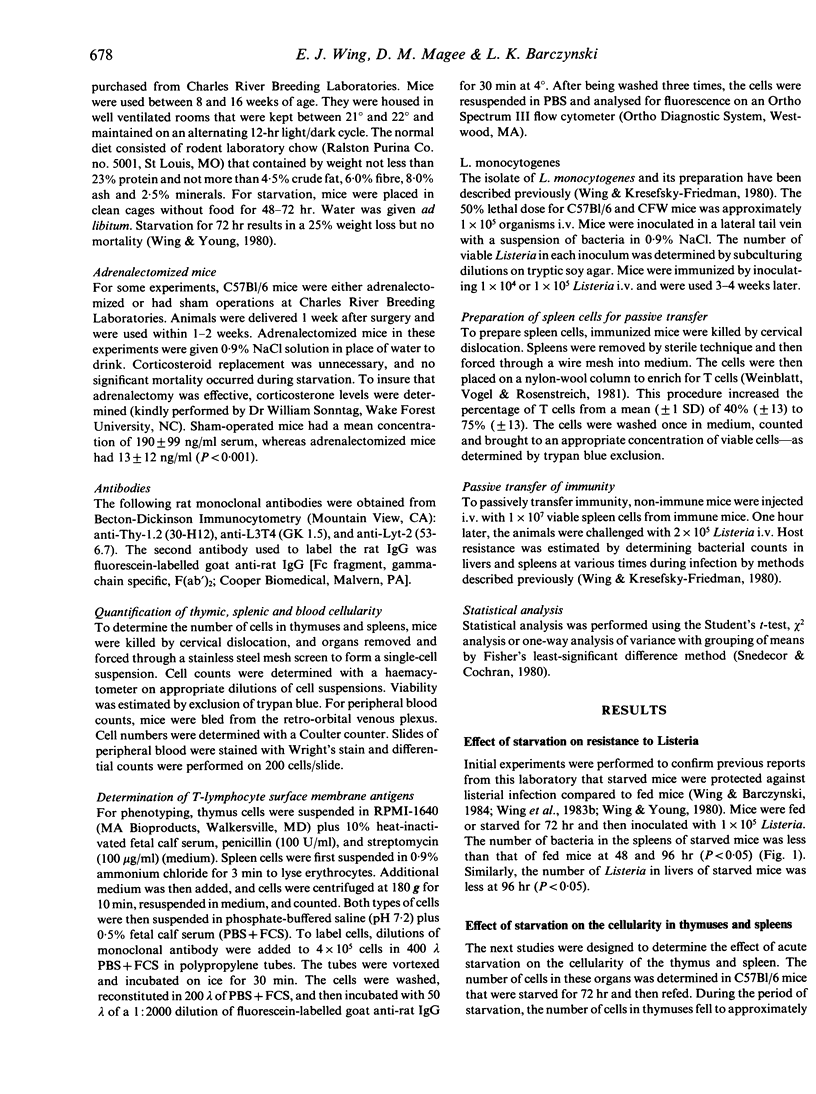
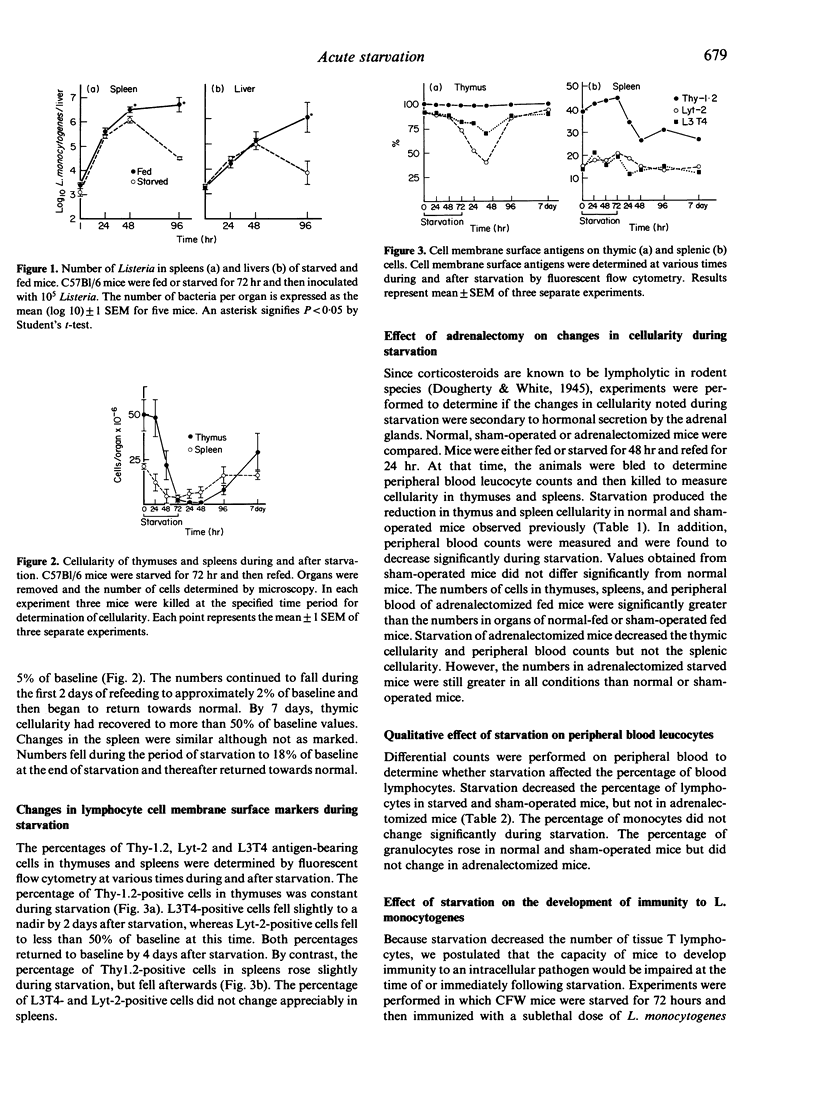
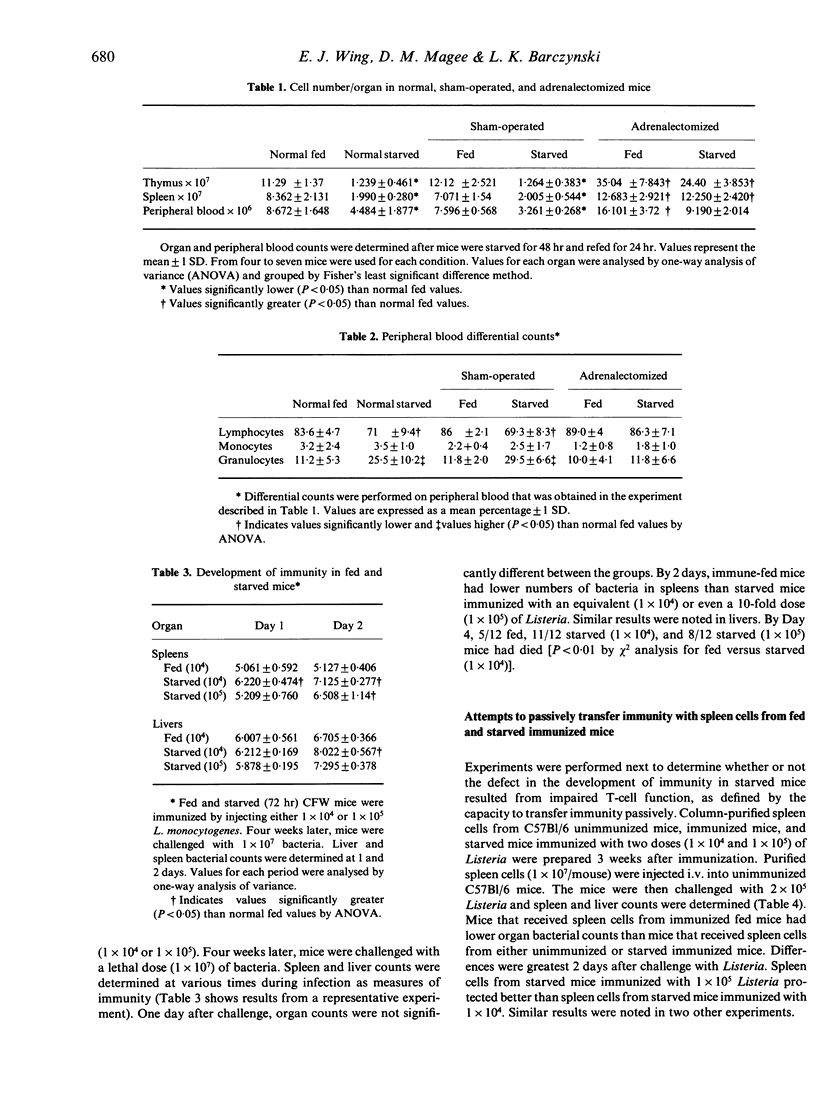
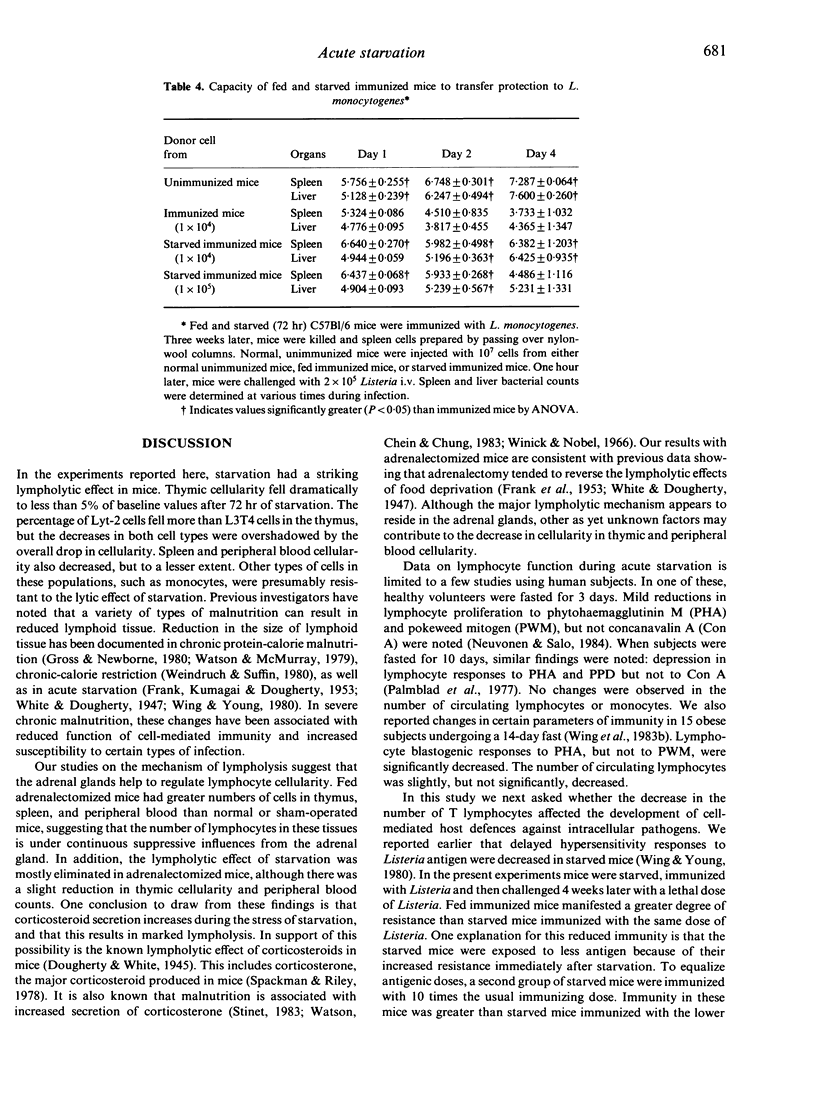
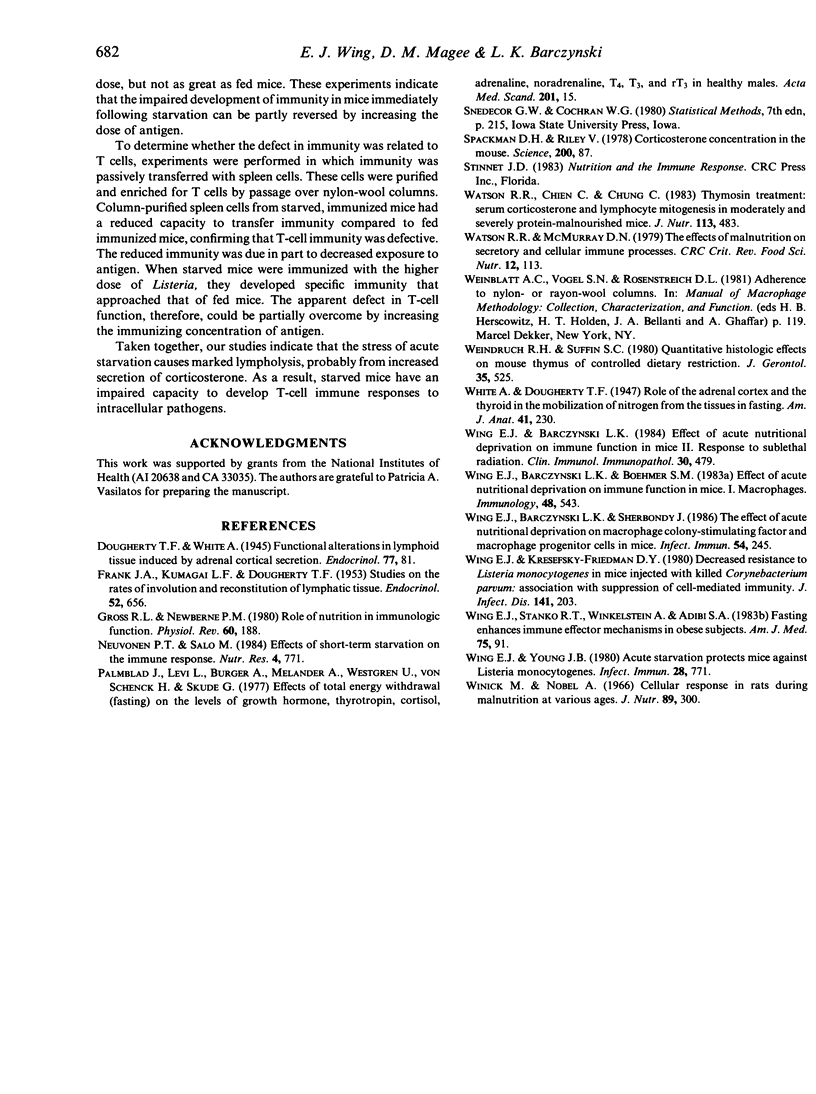
Selected References
These references are in PubMed. This may not be the complete list of references from this article.
- FRANK J. A., KUMAGAI L. F., DOUGHERTY T. F. Studies on the rates of involution and reconstitution of lymphatic tissue. Endocrinology. 1953 Jun;52(6):656–668. doi: 10.1210/endo-52-6-656. [DOI] [PubMed] [Google Scholar]
- Gross R. L., Newberne P. M. Role of nutrition in immunologic function. Physiol Rev. 1980 Jan;60(1):188–302. doi: 10.1152/physrev.1980.60.1.188. [DOI] [PubMed] [Google Scholar]
- Palmblad J., Levi L., Burger A., Melander A., Westgren U., von Schenck H., Skude G. Effects of total energy withdrawal (fasting) on thelevels of growth hormone, thyrotropin, cortisol, adrenaline, noradrenaline, T4, T3, and rT3 in healthy males. Acta Med Scand. 1977 Jan;201(1-2):15–22. doi: 10.1111/j.0954-6820.1977.tb15648.x. [DOI] [PubMed] [Google Scholar]
- Watson R. R., Chien G., Chung C. Thymosin treatment: serum corticosterone and lymphocyte mitogenesis in moderately and severely protein-malnourished mice. J Nutr. 1983 Mar;113(3):483–493. doi: 10.1093/jn/113.3.483. [DOI] [PubMed] [Google Scholar]
- Watson R. R., McMurray D. N. The effects of malnutrition on secretory and cellular immune processes. CRC Crit Rev Food Sci Nutr. 1979 Dec;12(2):113–159. doi: 10.1080/10408397909527275. [DOI] [PubMed] [Google Scholar]
- Weindruch R. H., Suffin S. C. Quantitative histologic effects on mouse thymus of controlled dietary restriction. J Gerontol. 1980 Jul;35(4):525–531. doi: 10.1093/geronj/35.4.525. [DOI] [PubMed] [Google Scholar]
- Wing E. J., Barczynski L. K., Boehmer S. M. Effect of acute nutritional deprivation on immune function in mice. I. Macrophages. Immunology. 1983 Mar;48(3):543–550. [PMC free article] [PubMed] [Google Scholar]
- Wing E. J., Barczynski L. K. Effect of acute nutritional deprivation on immune function in mice. II. Response to sublethal radiation. Clin Immunol Immunopathol. 1984 Mar;30(3):479–487. doi: 10.1016/0090-1229(84)90033-3. [DOI] [PubMed] [Google Scholar]
- Wing E. J., Barczynski L. K., Sherbondy J. M. Effect of acute nutritional deprivation on macrophage colony-stimulating factor and macrophage progenitor cells in mice. Infect Immun. 1986 Oct;54(1):245–249. doi: 10.1128/iai.54.1.245-249.1986. [DOI] [PMC free article] [PubMed] [Google Scholar]
- Wing E. J., Kresefsky-Friedman D. Y. Decreased resistance to Listeria monocytogenes in mice injected with killed corynebacterium parvum: association with suppression of cell-mediated immunity. J Infect Dis. 1980 Feb;141(2):203–211. doi: 10.1093/infdis/141.2.203. [DOI] [PubMed] [Google Scholar]
- Wing E. J., Stanko R. T., Winkelstein A., Adibi S. A. Fasting-enhanced immune effector mechanisms in obese subjects. Am J Med. 1983 Jul;75(1):91–96. doi: 10.1016/0002-9343(83)91172-5. [DOI] [PubMed] [Google Scholar]
- Wing E. J., Young J. B. Acute starvation protects mice against Listeria monocytogenes. Infect Immun. 1980 Jun;28(3):771–776. doi: 10.1128/iai.28.3.771-776.1980. [DOI] [PMC free article] [PubMed] [Google Scholar]
- Winick M., Noble A. Cellular response in rats during malnutrition at various ages. J Nutr. 1966 Jul;89(3):300–306. doi: 10.1093/jn/89.3.300. [DOI] [PubMed] [Google Scholar]


